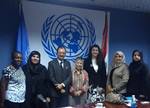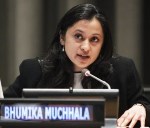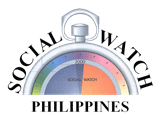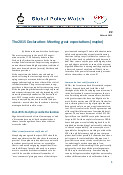Social Watch news
Published on Fri, 2015-07-24 10:05
Iraqi civil society organizations and women activists, demand support through the work of the UNAMI and the United Nations family. CSOs present a number of proposals for consideration during the upcoming discussions of the UN Security Council on the renewal of the mandate for the United Nations Assistance Mission for Iraq (UNAMI). Given the current security situation which has continued to deteriorate due to the conflict with ISIL, which is threatening also the security of the whole MENA region and the global security, we are particularly concerned about the situation of women and children, especially those living in areas under military operations and the huge number of IDPs exceeding 4 million. Plus, CSOs are concerned about the gross violation of Human Rights. Reports of sexual violence against women and girls continue to be received and boys continue to radicalized and recruited as terrorist fighters. |
Published on Thu, 2015-07-23 19:47
Climate change is costing us dear. Unless we rein it in, there will be more failed harvests, flooding in low-lying coastal areas, disease, mass migration and armed conflict over resources. Stopping it also comes at a price. It would mean completely switching energy generation, industrial production and transport systems to renewable energy sources – which is what the concept of climate protection means. Moderate estimates are that as of the year 2020, US$200 billion will have to be invested every year in emerging and developing countries. In addition, 50 billion would need to be invested annually in adaptation to climate change. This would include coastal protection systems for coping with rising sea levels, altering water courses or resettling communities in the countries affected, to mention but a few points. |
Published on Thu, 2015-07-23 19:21
The third Financing for Development (FfD) conference in Addis Ababa concluded last Thursday, July 16, in bad faith as developed countries rejected a proposal for a global tax body and dismissed developing countries’ compromise proposal to strengthen the existing U.N. committee of tax experts. Usually, when large conferences end after conflicts and climax in intergovernmental negotiations, there is a sense of exhilaration. This did not happen in Addis Ababa. |
Published on Thu, 2015-07-23 19:13
The third Financing for Development (FfD) conference in Addis Ababa concluded last Thursday, July 16, in bad faith as developed countries rejected a proposal for a global tax body and dismissed developing countries’ compromise proposal to strengthen the existing U.N. committee of tax experts. Usually, when large conferences end after conflicts and climax in intergovernmental negotiations, there is a sense of exhilaration. This did not happen in Addis Ababa. |
In an inter-connected world, a US human rights-centered macroeconomic and financial policy is needed
People around the world were impacted by the 2008 financial crisis which stemmed from the US´s financial policies. The key human rights lesson from the crisis is that the economic and social rights of people and nations everywhere are interconnected. In our inter-connected world, the US must make economic decisions that respect the human rights of all individuals who will be impacted by national, economic, financial and fiscal policy. At one level, economic policy in the United States should be guided by the principle of progressive realization and non-retrogression. Progressive realization recognizes that the resources at the disposition of a government are limited; nevertheless, a government must take specific steps to ensure that the enjoyment of economic and social rights improves over time. Non-retrogression means that once a particular level of enjoyment of rights has been realized, it should be maintained. |
Published on Thu, 2015-07-16 00:00
People around the world were impacted by the 2008 financial crisis which stemmed from the US´s financial policies. The key human rights lesson from the crisis is that the economic and social rights of people and nations everywhere are interconnected. In our inter-connected world, the US must make economic decisions that respect the human rights of all individuals who will be impacted by national, economic, financial and fiscal policy. At one level, economic policy in the United States should be guided by the principle of progressive realization and non-retrogression. |
Published on Tue, 2015-07-14 14:16
Manila, Philippines–Today, we witness state leaders, high-level officials, civil society groups, and business representatives convene for the Third International Conference on Financing for Development (FfD3) in Addis Ababa, Ethiopia to discuss and agree on an action plan for financing development, including the Sustainable Development Goals to be adopted by UN member states in the September 2015 Summit. “We started from an optimistic viewpoint on FfD3 and now ending with so much disappointment over what seems like retrogression from old agreements. There is no mention at all of peace dividends generated from the elimination of weapons of mass destruction and nuclear weapons, and the reduction in defense spending. Debt relief and condonation are treated marginally. The emerging document suggests business as usual. It doesn’t explain the fundamental reasons for why there is lack of financing sustainable development,” lamented Isagani Serrano, co-convener of Social Watch Philippines (SWP) and president of the Philippine Rural Reconstruction Movement (PRRM). |
Published on Wed, 2015-07-08 11:07
With pens still hovering over the Addis Ababa Action Plan, the outcome agreement for the Third International Conference on Financing for Development (FfD3), there is already a sense that for all the recent talk at the UN about ambition and transformation, it is falling short. For a financing document, the Action Plan includes an impressive number of references to issues at the core of sustainable and inclusive development, like social protection, essential services, decent work for all and sustainable industrialization. There are multiple references to consumption and production, a rebalancing of which, among the rich and the poor, will determine the future of our world. |
Published on Tue, 2015-07-07 13:34
A graphic summary of the state of the negotiations around the post-2015 development agenda in the first days of July, showing where there is consensus and who is behind the different conflicting propositions. Green, Yellow, Red The issues highlighted are arranged in 4 groupings: - Preamble and declaration - Goals and targets - Means of implementation. - Follow-up ad review These groupings mirror the four main sections of the draft UN outcome document for the post-2015 development agenda currently being negotiated by governments at UN headquarters in New York. This summary was compiled by GPW based on national and negotiating group interventions in 3 main clusters. |
Published on Mon, 2015-07-06 00:00
The open-ended intergovernmental working group in charge of elaborating an international legally binding instrument on transnational corporations (TNCs) and other business enterprises with respect to human rights convened its first session in Geneva on Monday. The inaugural session of the Working Group (6-10 July) appointed Ambassador Maria Fernanda Espinosa of Ecuador as its Chairperson-Rapporteur. The session opened with a video message from the United Nations High Commissioner for Human Rights Mr Zeid Ra'ad Al Hussein. It also heard some opening remarks by its keynote speaker, Ms Victoria Tauli-Corpuz, the United Nations Special Rapporteur on the rights of indigenous peoples, who told the delegates that an international legally binding instrument on business and human rights could contribute to redressing gaps and imbalances in the international legal order that undermine human rights, and could help victims of corporate human rights abuse access remedy. |
SUSCRIBE TO OUR NEWSLETTER










